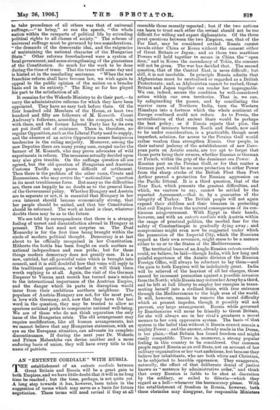THE SITUATION IN HUNGARY. T HE new Hungarian Parliament is a
Parliament of transition. The Ministry has been appointed to mark time .till the air clears and the course is apparent. Like all transition Parliaments, it is largely a make- believe, for it professes a formal unanimity which cloaks the widest disparities of political faith. The Premier, the nominal leader, is neither the chief man in the House nor in the country. The Cabinet is equally divided between the Con- stitutionalists and the Party of Independence, but Apponyi and Kossuth are more formidable names than Andrassy and Wekerle. The settlement of 1848 is being held up against the settlement of 1867,—privately, to be sure, for the matter is not yet at public issue; and so far as the House is concerned. there seems little question that on a division the vote would be for the former and separation. This, however, is not yet the opinion of the country, as M. Kossuth, who must now rank as the foremost Hungarian statesman, observed last week at a meeting of his supporters. He has recognised that this question is still premature, and that in the meantime " the business of his Majesty's Government must be carried on." The hatchet of separa- tion is therefore buried for the moment, and all parties have addressed. themselves to the task of setting to rights the Constitutional machine and healing the disorders which have appeared. during the past eighteen months of confusion. When the house is once more in order, and the political atmosphere has improved, the old quarrel will be resumed. That is the frame of mind common in the new Hungarian Parliament, and it says much for its patriotism and good sense. A year's preoccupation with administra- tive questions will do wonders in weakening separatist ardour. The men who enter upon the truce eager to renew the fight as soon as it expires will find their feelings cool and their point of view change miraculously before many months have passed. Besides, the essential question for Hungary is not whether the Dual Monarchy is legally justified or sentimentally attractive, but whether it is not the only arrangement capable of ensuring her national existence. And on this point, long before the time has ended, she may have to listen to the unanswer- able logic of events.
For the moment, at any rate, things are going smoothly. The Hungarian Constitution—which is dear to a free and spirited people as the sign visible of their liberties—has been restored to its former authority, after the months of rude buffeting it has suffered at the hands of King and demagogues alike. Francis Joseph has recovered his old popularity, as was shown by his reception this week at Budapest. On that occasion, both in manner and garb, the Independence leaders were metamorphosed. into courtiers. The Speech from the Throne, too, was a judicious piece of work. It regretted past misunderstand- ings, and held the " sure hope" of future amity. It welcomed the " restoration of legal and judicial con- tinuity." The finances of the State had suffered.' by the recent confusion ; there were arrears of taxes to be collected ; and some adjustment must be made 'as to the Services common to Hungary and Austria. With an obvious reference to Germany, the necessity of keeping the Army up to a high standard was insisted upon. Then came a long.hst of internal reforms. The question which was to take precedence of all others was that of universal suffrage,—" to bring," so ran the speech, " the whole nation within the ramparts of political life by extending political rights to all classes of society." The scheme of universal suffrage must be governed by two considerations, " the demands of the democratic idea, and the exigencies of maintaining the national character of the Hungarian State." Other reforms foreshadowed were a system of local government, and some strengthening of the guarantees of the Constitution. So much for the work to be done during the time of truce. That the truce will some day end. is hinted. at in the concluding sentences. " When the new franchise reform shall have become law, we wish again to appeal to the public opinion of the nation on a broader basis and in its entirety." The King so far has played his part to the satisfaction of all.
It remains for the Wekerle Ministry to do their part,—to carry the administrative reforms for which they have been appointed. They have no easy task before them. Of the four hundred odd. Members of the House, at least two hundred and fifty are followers of M. Kossuth. Count Andrassy's followers, according to the compact, will vote with them, and the former. Liberal Party has by its own act put itself out of existence. There is, therefore, no regular Opposition, such as the Liberal Party used to supply, and the absence of an active Opposition means fissiparous tendencies in the ruling majority. Moreover, among the new Deputies there are many young men, ranged under the banner of M. Kossuth, who may prove advocates of wild experiments in reform. The measures actually decided upon may also give trouble. On the suffrage question all are agreed, but the old question of Hungarian and Austrian Customs Tariffs may prove difficult of settlement. Then there is the problem of the other races, Croats and Roumanians, who may revive the " nationalities " question in its most troublesome form. But many as the difficulties are, there can happily be no doubt as to the general lines of the Government policy. Whether Hungary and Austria are to separate or not, it is essential that Hungary in her own interest should. become economically strong, that her people should be united, and that her Constitution should be reformed. The work at hand is clear, whatever doubts there may be as to the future.
We are told by correspondents that there is a strange feeling of unrest and dissatisfaction abroad in Hungary at present. The fact need not surprise us. The Dual Monarchy is for the first time being brought within the circle of modern political thought. Democracy is at last about to be officially recognised. in her Constitution. Hitherto the battle has been fought on such matters as national independence and race pride ; but for these things modern democracy does not greatly care. It is a new, untried, but all-powerful voice which is brought into council, and it is still doubtful how that voice will reply to the traditional questions, or whether it will think them worth replying to at all. Again, the visit of the German Emperor to Vienna next month has turned men's minds to the international importance of the Austrian Empire, and the danger which its parts in disruption would incur from their ambitious northern neighbour. The populace of Austria-Hungary are not, for the most part, in love with Germany, and, now that they have the last word in the question, they may be trusted. to allow no spurious national pride to compromise national well-being. We are of those who do not think separation the only issue of the Hungarian crisis. The old arrangement may require modification, like all human arrangements, but we cannot believe that any Hungarian statesman, with an eye on the European situation, can advocate its complete discontinuance. If during the next year Dr. Wekerle and Prince Hohenlohe can devise another and a more enduring basis of union, they will have every title to the name of patriots.











































 Previous page
Previous page